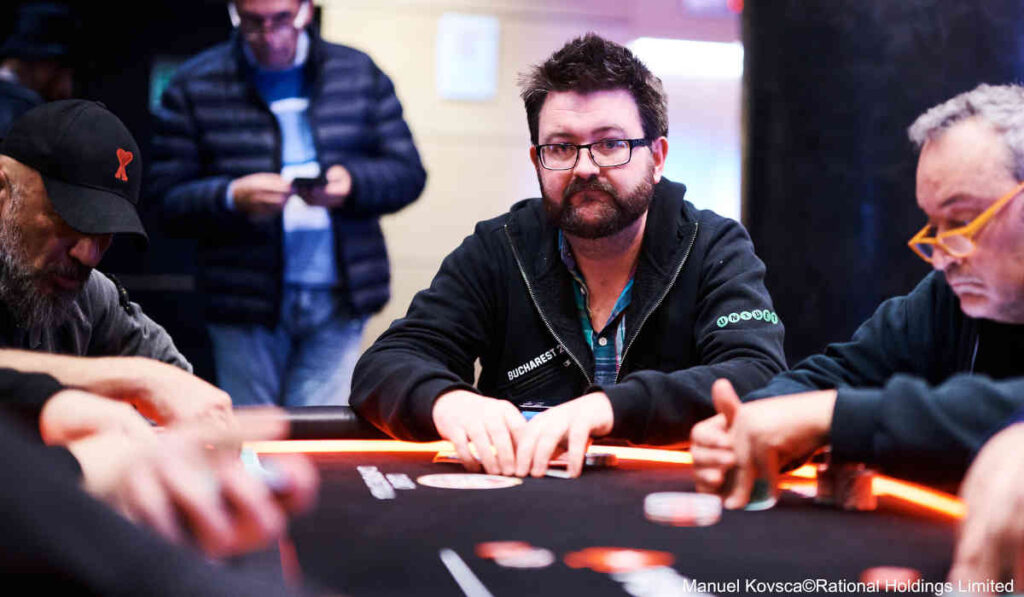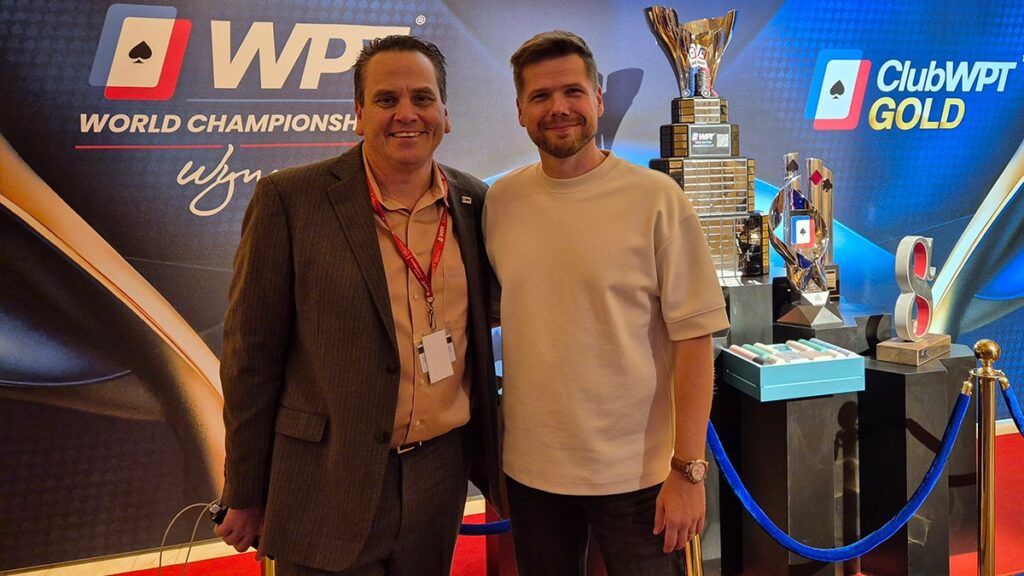Few players have left as indelible a mark on the world of poker as that of Irish poker pros Dara O’Kearney and David Lappin.
Poker’s dynamic duo are known as much for their prowess on the felt, with The Hendon Mob clocking O’Kearney at nearly $1,500,000 in tournament cashes, and Lappin at more than $900,000, as they are for their media presence off it.
O’Kearney has authored several books on poker strategy, and they both co-host the award-winning podcast ‘The Chip Race,’ which enters its tenth year.
The show will be seeking a new sponsorship deal after an eight-and-a-half-year run with their main sponsor, Unibet, comes to an end on June 1.
When asked if the show could continue without a sponsor, O’Kearney replied,
What people don’t understand is how much work goes into every episode, particularly on David’s side. We both make our living from poker, we can’t justify giving up 20-25 hours per show unless there’s some income from it.
The final Unibet-sponsored episode of ‘The Chip Race’ airs this month, but O’Kearney assures fans of the show, “Although nothing has been agreed yet, there does seem to be genuine interest in it, and we are hopeful.”
Origin Stories
O’Kearney’s Irish roots run deep. His grandfather was a political activist who carried a reputation for having blown up every bridge in Ireland, and his grandfather’s cousin, Peadar O’Kearney, co-wrote the Irish national anthem.
Dara, or ‘Doke,’ as his friends call him, was a chess player in his youth who graduated to bridge and backgammon in his 20s, but discovered his love for ultramarathon running in his 30s.

O’Kearney excelled, winning the New York City ultramarathon and becoming Ireland’s 24-hour running national champion.
Heading into his 40s, O’Kearney knew the clock on his running career was winding down and started looking for something new to fuel his competitive spirit. It would be episodes of the Irish Poker Open airing on TV that piqued his interest.
I saw that it was people of all ages, shapes, and sizes, and it occurred to me that this is something where age doesn’t seem to be a factor.
O’Kearney’s brother played online at the time and was tasked with showing him the ropes.
My brother told me to start playing freerolls. He was obviously worried about me losing money quickly because of my compulsive nature. But after a short while, I was making more money than my job as a technology consultant.
Lappin took a different route into poker, but their journeys share similarities. A gamesman in his teens, Lappin played the odd poker game here and there and ran a yearly tournament in college, where he graduated with a degree in screenwriting.

In an attempt to combine his two passions, Lappin spent his first years out of school writing a TV show where the main protagonist is a poker player.
The show ultimately didn’t get off the ground, but Lappin credits his research into the world of poker during the writing process as intensifying his interest in the game.
I had dived into some online poker and casino poker just to get a sense of what that world really looked like… And when the show was cancelled, I decided to just keep trying online.”
An Unlikely Friendship
Both players cut their teeth playing online sit-and-go’s, and credit running hot early on as helping jumpstart their careers. For example, O’Kearney’s inaugural Hendon Mob entry is a first-place finish in the $1,500 European Deepstack Poker Championship for $70,000.
The two began encountering each other in Irish gambling houses, with O’Kearney claiming he would warn Lappin about dicey characters and whom to avoid picking fights with.
Lappin admits there was a synergy between them and credits their mutual love for hometown writers Samuel Beckett and James Joyce as helping their relationship blossom.
O’Kearney mentions, “We are both well read in that kind of stuff, so we could talk about it, which is unusual in poker.”
A shared love for literature and an observation early in their friendship compelled them to diversify their careers and accept an opportunity to record a podcast.
Lappin posits,
Every three years, about half the people you see in poker disappear from poker. We realized the real enemy is variance… Or sitting on your laurels, thinking your game today, which seems pretty good, is not going to be necessarily good next year or the year after.
Lappin points to a night in Madrid before their transition into authorship and content creation, where the two had a seminal chat about potentially entering the media side of the industry and, as Lappin puts it, “About the bigger picture.”
I remember that chat really well, it was a big turning point for both of us, Lappin says. It was a real moment where we realized it’s probably a smart, bigger-picture decision to branch out.
Career Highlights and Interviewing a Movie Star
It would be a year after the first seven episodes of ‘The Chip Race’ aired that Unibet picked them up as a sponsor.
A partnership that has overseen the recording of more than 170 episodes over 25 seasons, and birthed a spin-off podcast called ‘The Lock In,’ a companion show with a looser tone.
When probed about their career highlights, O’Kearney and Lappin mention tournament scores they’re proud of, but place their media success at the top of the list.
While awards are nice, knowing that the show is received so well by the audience is the thing that makes you proud, says Lappin. A random Tuesday afternoon at a poker festival in a foreign country, when someone comes up and says they like your work, those are always the nicest moments.
Few guests of the show have intimidated the duo, but they did mention an instance where Jennifer Tilly was promoting a film she was in, and her marketing team wouldn’t pay for her to be interviewed on a poker podcast.
So, she gave up her lunch hour to grant them an in-person interview, and they felt the pressure was on to deliver.
Luckily, O’Kearney says Tilly was incredibly gracious and they were able to rise to the occasion, stating, “She was so amazing, she gave us an amazing interview.”
O’Kearney and Lappin also reveal being proud of their longevity in the industry, and credit a player-centric approach as a major contributing factor.

Lappin tells us:
We have had roles within the industry, but the times when players around us were complaining about online sites or live operators worsening their products and charging more for it, we always spoke out about those things.
We always wrote articles that expressed the opinion most of the players around us felt, even if we upset loads of people who were our friends by doing it.
Lappin continued:
If your north star is always the players and the player experience, you’re on the right track. Because the industry has to follow them; they’re the customer.
Advice to the Next Generation
With the poker industry, and by proxy, the future of professional poker as a career, in such a delicate state, O’Kearney advises the next generation of poker players to follow a similar blueprint to his and Lappin’s.
Look for other income streams as well. Don’t just try and make your entire living from playing online poker. There are other opportunities out there, there’s content creation, there’s Twitch, YouTube, all these other things.
From the start, I felt diversification was always a good thing, and now it’s reached the stage where I make much more money from the other stuff than I do from actually playing poker.
But Lappin relents:
It’s a lot of hard work. Dara has his fabulous books and his training site, we both have the show, we both have our writing stuff, we both do commentary.
And people would go, oh look, these lads have all these strings to their bows, but we sort of added them gradually, or added them for free initially… knowing that they would lead us to things that would be lucrative down the line. But I don’t know anybody who sleeps less and works harder than Dara, for example.
Poker’s Future
O’Kearney would like to see poker advertised as more of a strategy game, instead of a “mindless gambling game like slot machines.
He feels this approach may lead to operators securing more corporate sponsorships, and a percentage of that sponsorship money making its way into prize pools.
He also would like to see the industry address the issue of ageism.
Poker for too long has largely tried to market to young people. Older people have more disposable income than, say, the 18-year-old still living at home, and they have more time to go on trips.”
Lappin agrees,
Most poker shows focus on one or two kinds of players, and they’re both male, young, online crusher or live beast. What we tried to do with ‘The Chip Race’ was to do a show that was a variety show and have parts that are about dealers and industry figures and see what they’re trying to do in the game.
Lappin would also like to see the game avoid promoting people like crypto influencer Haliey Welch, who was at the center of a controversial meme coin scandal that accused her of “rug pulling” her supporters.
We have individual responsibilities to clean up the game,” said Lappin, and “People like her should be pariahs, not only in the poker world, but pariahs full stop.
Final Thoughts
O’Kearney and Lappin have carved out a legacy in poker that transcends the felt, combining media savviness with an unflinching commitment to the player community.
From ultramarathons to award-winning podcasts, their careers embody resilience and adaptability, proving that success in modern poker isn’t just about mastering the game itself but evolving alongside it.
As The Chip Race enters its next chapter, their story serves as both a blueprint, a challenge to future players, to the industry, and to themselves.
So here’s to two of Ireland’s finest, and two people who provide poker the integrity it seems to so desperately need lately.
Sláinte!


